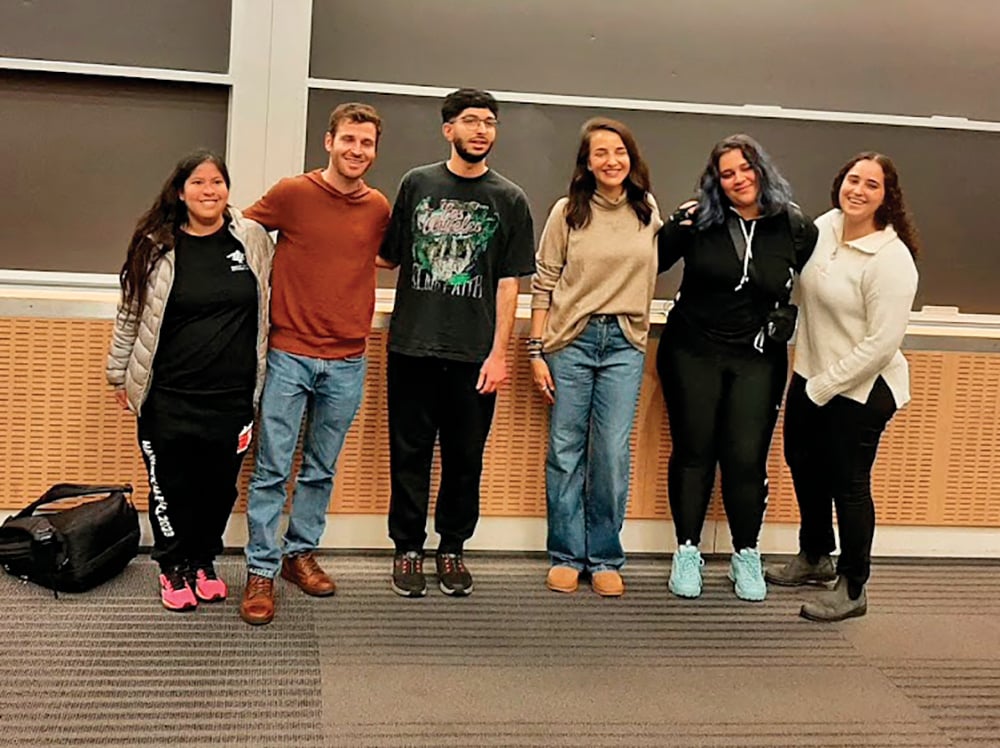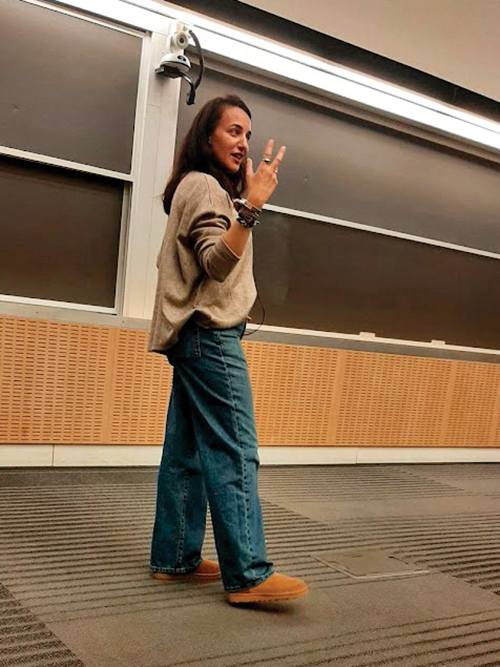
For Lucy Aharish the October 7 terrorist attack on Israel by Hamas was personal.
“It was personal for me because I’m a woman,” she said. “It was personal for me because I’m an Arab. It was personal for me because I’m a Muslim and it was done in the name of Islam.”
Aharish, who is a news anchor and host of a morning news show on Israeli television, spoke April 2 in a program sponsored by Rutgers Hillel at the Academic Building on the university’s main campus in New Brunswick. The event drew a large crowd of Jewish students and community members, but no protesters.

In a program that ran about 2 ½ hours, she spoke of her many identities as an Arab Muslim in Israel and the complexities driving the Middle East’s turmoil.
Aharish recalled an incident as she was entering first grade that has shaped her view throughout life. “My mom sat me down and said no matter what people tell you, no matter if they beat you up or make your life miserable I want you to remember you are a Muslim, you’re an Arab and you’re Israeli. Be proud of it.”
To this day Aharish said she is proud of all her identities.
As an Israeli Aharish talked about the terror she felt on that morning of October 7 as she wondered if she could save her 3-year-old son by hiding him in the washing machine if the terrorists came to her home. She knew that being Arab and Muslim would be irrelevant to the terrorists, who would view her as a “cooperator” because she lived in Israel.
Aharish is a reporter, presenter and program host on Israel’s Channel 2; and a primetime manager, anchor and presenter on the evening edition of i24NEWS and host of a morning news show. She is the winner of the OMETZ (courage) award for her fight against racism in Israeli society.
“The reality is, Israel is complicated,” she said. “When I speak and defend Israel I am defending my country. I am defending my home. I am defending my friends and family. I differentiate between defending my country and defending my government. I am one of the biggest critics of this government. But it has nothing to do with the fact that Israel is my homeland.”
“I spoke in Arabic against racism. I spoke in Arabic for Jews and Arabs to get along. I spoke for the state of Israel. I want my state to be glorified and I want my state to continue growing.”
She recalled as a young child, when Israelis were still allowed to go into Gaza, returning with her family and her uncle’s family from a shopping trip. While stopped in traffic she noticed a large man carrying something approaching their car with its Israeli license plates. Suddenly two Molotov cocktails exploded—one inside and one outside the vehicle. Although Aharish was not injured and the family was rescued by security forces, her cousin was severely burned and required numerous surgeries.
“Since that day I hated Palestinians,” she said.
Although long past that hatred, October 7 “took me back to being 5 ½ years old again. I was filled with hate. I didn’t want to see the other side.”
Choking up as she spoke, Aharish said that as a journalist she forced herself to see the other side and came to a realization. “As the days passed I understood that is exactly what Hamas wanted … the brutality of that day, they wanted the other side to lose compassion.”
Aharish lamented the hatred being instilled in children in the region, adding: “It’s not a natural thing to hate Muslims, to hate Jews. Kids are not mean. We educate kids to be mean.”
Fortunately, her parents did not subscribe to that thinking. They moved to a heavily Jewish neighborhood, where Aharish dressed as Queen Esther on Purim. Although both of her grandfathers died before she was born, she knew the elderly Holocaust survivor with the number tattooed on his arm who lived below her family. “Grandpa Menachem” knew her favorite candies.
She has been told by both Jews and Arabs alike, they wished more of the other could be just like her.
“We’re living in stereotypes,” she said. “Arabs are like this, Christians and Mizrachi are like that, and leftists are like that, and rightists are like this, and Democrats are like that, and Republicans are like this. Maybe we don’t know all the people in the world. Maybe what we know is not true. Maybe it’s based on something I read on TikTok or in my echo chamber of Instagram or Facebook or the people I’m with.”
She believes that solving the stalemate in the Middle East will require brave leaders like Anwar Sadat and Menachem Begin, willing to be bold. “You don’t do peace with those you like.”
Aharish said those outside the Middle East really can’t understand its complexities and issues without living or at least visiting. She questioned whether protesters shouting “Free Palestine” or “From the River to the Sea” even know what they mean or had even been to the West Bank or Gaza. Had they been in Israel and had 15 seconds to get to a bomb shelter when sirens warned of incoming rockets?
“To hate is to choose the easiest way,” she said. “To love is a challenge.”
Debra Rubin has had a long career in journalism writing for secular weekly and daily newspapers and Jewish publications. She most recently served as Middlesex/Monmouth bureau chief for the New Jersey Jewish News. She also worked with the media at several nonprofits, including serving as assistant public relations director of HIAS and assistant director of media relations at Yeshiva University.












